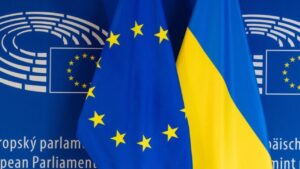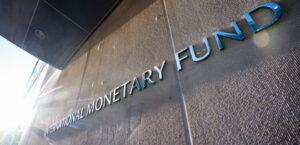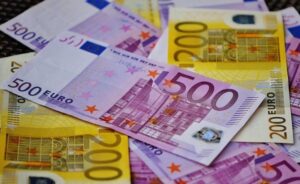
Ukraine received another tranche of macro-financial assistance from the European Union in the amount of EUR1 billion under the ERA Loans program, Prime Minister Yulia Svyrydenko said
“This tranche is financed from the proceeds of frozen assets of the Central Bank of the Russian Federation. This is more than aid — it is a clear signal: Europe is resolutely strengthening Ukraine’s defense and resilience against massive missile attacks and attempts at destabilization,” Svyrydenko wrote on Telegram on Wednesday.
The Ministry of Finance reminded that a total of EUR 10 billion has already been raised from the European Union as part of the ERA initiative, and Ukraine is expected to receive the remaining EUR 8.1 billion from the EU in installments by the end of 2025.
The prime minister thanked European Commission President Ursula von der Leyen and European Commissioner Valdis Dombrovskis for their leadership and steadfastness.
“These funds mean saved lives, rebuilt cities, and a secure European future for Ukraine,” she emphasized.
The ERA provides for $50 billion to be allocated to Ukraine, which will be secured by future revenues from Russia’s frozen assets. The EU’s contribution amounts to EUR18.1 billion (EUR20 billion).
In March this year, European Commissioner for Economy Valdis Dombrovskis announced that the EU plans to allocate EUR 30.5 billion to Ukraine this year, including EUR 12.5 billion under the Ukraine Facility program and EUR 18 billion under the ERA mechanism: the first EUR 3 billion was allocated in January, EUR 1 billion per month in March-November, and EUR 6 billion in December.
The IMF’s Extended Fund Facility (EFF) program provides for Ukraine to receive $39.4 billion under the ERA mechanism this year, following $1 billion last year.
According to the Ministry of Finance, since February 2022, the European Union has been the largest provider of direct budgetary assistance to Ukraine – EUR 58.5 billion for priority state budget expenditures, including over EUR 16.5 billion for the first eight months of 2025.

The Council of the European Union has approved the fourth tranche of the Ukraine Facility program in the amount of more than EUR3.2bn, while its size was previously determined at around EUR3.05bn.
“The objective is to support Ukraine’s macro-financial stability as well as its recovery, reconstruction and modernization,” the EU Council said in a statement.
As reported, the size of the tranche was reduced from the planned EUR4.5bn due to delays in the implementation of 3 out of 16 indicators that Kiev had to fulfill according to the Ukraine Facility’s Ukraine Plan: the laws on the territorial organization of executive power (the so-called “decentralization reform”) and on the ARMA reform, as well as the selection of 25 judges for the Supreme Anti-Corruption Court in a competition in which only 2 candidates reached the finish line.
At the same time, the head of the Economy Ministry, Oleksiy Sobolev, noted that Ukraine will fulfill two of the three indicators (laws) before September, which will make it possible to receive EUR1.1bn tentatively in early November
As the Ministry of Finance of Ukraine reminded, in general, the state budget has already received EUR19.6bn within the framework of the Ukraine Facility program, the total amount of which is EUR50bn. In 2025 alone, about EUR12.5bn of financial support for Ukraine is envisaged, of which EUR3.5bn has already been attracted.
The European Union remains the largest donor of budget support for Ukraine – EUR53.5bn over more than three years, the Finance Ministry also noted.

Ukraine has received the third tranche of aid under the ARISE project — over UAH 1 billion, which will be used to support Ukrainian small producers and farms, the Minister of Agrarian Policy and Food said on Telegram.
The minister noted that payments are currently being made in three areas: subsidies per hectare of cultivated land, subsidies for keeping cows, and subsidies for keeping goats and sheep. Payments are being made by the Ukrderzhfond. The Ministry of Agrarian Policy and Food plans to complete them by the end of July.
Producers who are registered in the State Agricultural Register, have submitted their applications on time in accordance with all requirements, did not receive such assistance last year, and are included in the approved lists of recipients are eligible for assistance.

The IMF Board of Directors on Friday completed the fifth review of Ukraine’s EFF Extended Fund Facility (EFF) program, allowing Ukraine to receive about $1.1 billion (SDR834.9 million) of the 6th tranche, which will be used for budget support.
“Despite the challenging environment, Ukraine’s economy remains resilient and EFF performance remains strong. As of end-June, the authorities had met all quantitative performance criteria and achieved the four structural beacons,” the Fund said in a press release on its website.
After the discussion, IMF Managing Director Kristalina Georgieva said that the total external financing under the 4-year program is raised from $122 billion to $151 billion in the base case and from $144 billion to $187 billion in the negative case due to new commitments under the G7 initiative to allocate $50 billion to Ukraine from the proceeds on frozen Russian assets (“Emergency Loans to Accelerate Ukraine’s Revenue Growth”, ERA).
It is stated that sustainable reforms, mobilization of domestic revenues and timely provision of external support are necessary to ensure macroeconomic stability, restore fiscal and debt sustainability and enhance institutional reforms.
It is specified that the structural beacons related to the abolition of tax exemptions, war-affected state-owned companies, customs reform and public investment management have been implemented, while the implementation of two structural beacons has been postponed to allow more time to complete the reform.
The IMF noted that the economy has been more resilient than expected in the first half of 2024, thanks to continued growth, moderate inflation, and adequate reserves backed by significant external support. However, the outlook for the rest of the year and 2025 has deteriorated since the fourth review, mainly due to prolonged Russian attacks on Ukraine’s energy infrastructure and uncertainty over the war.
“Overall, the outlook remains exceptionally uncertain,” the Fund emphasized.
Georgieva said that all quantitative performance criteria are expected to be met at the end of September as well.

The Ministry of Finance and the National Bank of Ukraine, after reaching a staff-level agreement (SLA) with the IMF on the fourth review of the Extended Fund Facility (EFF) program, expect it to be approved by the IMF Board of Directors and the disbursement of the fifth tranche of the $2.2 billion program in the coming weeks.
“Ukraine has never reached the fourth review in any IMF program before. Today’s agreements are evidence of our commitment to reforms and changes for our country (…),” Prime Minister Denys Shmyhal commented on the agreement.
Minister of Finance Sergii Marchenko said that the government continues to work on implementing reforms and prioritizes maintaining economic stability and restoring Ukraine’s path to EU membership. He also thanked the IMF team for their efficient and well-coordinated cooperation.
According to the Ministry of Finance, the IMF experts emphasized the importance of the National Revenue Strategy and the implementation of certain of its provisions.
“The National Revenue Strategy is one of the structural beacons of the EFF-IF-U Program, which provides for the gradual implementation of measures aimed at reforming fiscal authorities and mobilizing tax revenues, as well as measures aimed at strengthening public confidence in tax and customs authorities,” the Ministry reminded.
For its part, the NBU noted that the future priorities of cooperation with the Fund will include strengthening banking regulation, supervision, lending, and capital market infrastructure.
In addition, considerable attention will be paid to increasing the level of financial inclusion, especially in the de-occupied territories and in regions close to active hostilities.
“Its low level is a deterrent to economic activity, so the NBU will focus on diagnostic work involving IMF and World Bank experts to develop effective measures,” the regulator said on its website on Friday evening.
The NBU is ready to further ease monetary policy provided that inflation expectations remain stable and hryvnia instruments remain attractive, which will be supported by a flexible exchange rate, the regulator said.
“Further balanced and gradual easing of currency restrictions in accordance with the Strategy should support economic recovery without creating risks to macrofinancial stability,” the NBU said in a statement.
According to the NBU, IMF experts noted that budget financing needs in 2024 remain very high. Given this, budget implementation should take into account financial constraints and the need to restore fiscal and debt sustainability.
“To ensure fiscal sustainability, Ukraine needs to accelerate the implementation of tax reforms and revenue administration envisaged by the National Revenue Strategy,” the press release says.
Among the priorities of the Program implementation, the regulator noted the strengthening of tax and customs administration, as well as strengthening public confidence through anti-corruption reforms and measures to properly protect taxpayers’ personal data.

Ukraine has received the eighth tranche of macro-financial assistance in the amount of EUR 1.5 billion from the European Union, Prime Minister Denys Shmyhal said.
“Today, Ukraine has received the eighth tranche of macro-financial assistance in the amount of €1.5 billion from the European Union. In total, the EU’s budget support for Ukraine in 2023 already amounts to €13.5 billion,” Shmyhal wrote in X on Friday.
According to the prime minister, the EU’s total support for Ukraine has reached approximately €70 billion since Russia’s full-scale invasion.